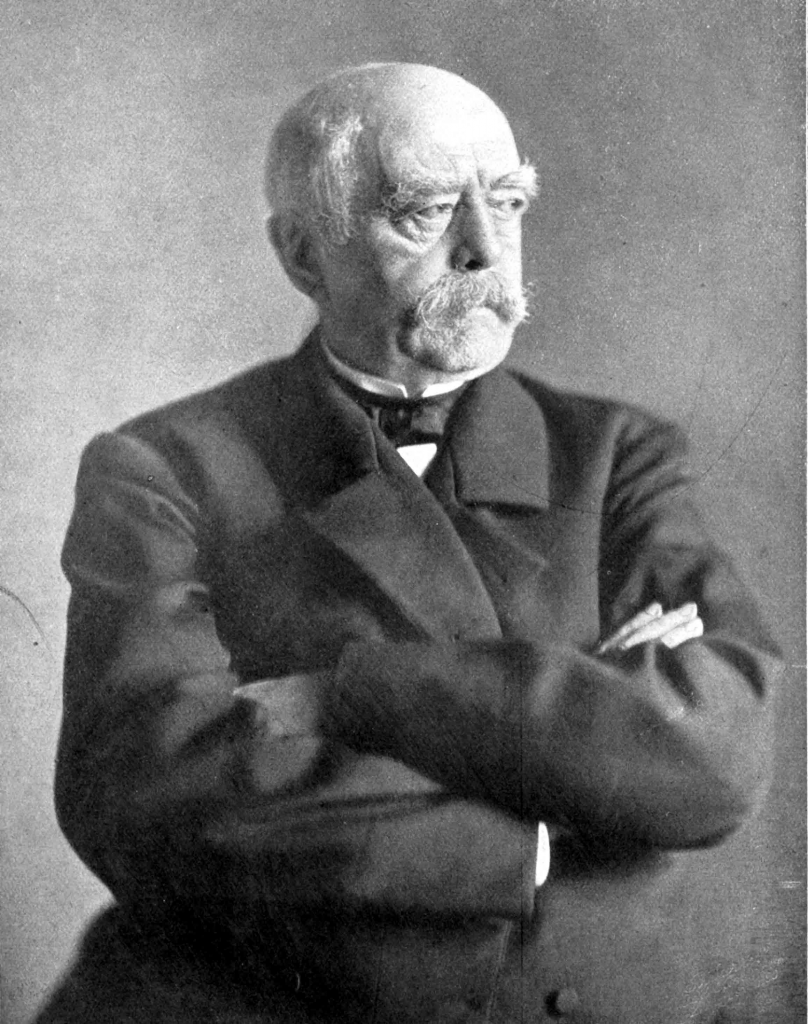On November 29, 1850, the Treaty of Olmütz was signed between Prussia and Austria, marking a significant turning point in European history. The event, often referred to as the “Humiliation of Olmütz,” was a bitter moment for the Prussian Kingdom, as it forced Prussia to submit to Austrian authority. However, for one man, this humiliation would not define him; instead, it would serve as the catalyst for a vision that would reshape Germany and Europe forever: Otto von Bismarck.

A Turning Point for Prussia
Otto von Bismarck was born on April 1, 1815, the same day Napoleon began his last gamble by escaping from Elba and returning to Paris. Three months later, Napoleon would be defeated at the Battle of Waterloo, a victory that greatly boosted the stature of Prussia within Europe. For Bismarck, this historical moment was the backdrop of his early years, providing an environment ripe for ambition and future success.
Bismarck came from a noble Junker family in Schönhausen, near Berlin, and later moved to Eastern Pomerania. His early education was marked by a rebellious streak and a tendency to challenge authority, a characteristic that would follow him throughout his life. After studying law at the University of Göttingen and the University of Berlin, Bismarck briefly worked in government, though his career was hampered by his disdain for bureaucracy. After a personal loss, he returned to his family’s estate in Pomerania, where he spent a decade living a somewhat wild life before finally returning to politics.
The Making of a Political Genius
Bismarck’s political career began in earnest in 1847 when he replaced a sick representative in the Prussian parliament. His work was initially quiet and unspectacular, but his real breakthrough came after he publicly supported King Friedrich Wilhelm IV’s decision not to go to war with Austria during the Olmütz crisis. Despite the widespread anger among the military elite, Bismarck’s calm and rational stance caught the king’s attention and marked him as a future ally.
In the years that followed, Bismarck’s rise continued as he was appointed Prussia’s ambassador to several European capitals, including St. Petersburg and Paris. These roles sharpened his diplomatic skills and gave him a deep understanding of European geopolitics. By 1862, Prussia faced a major political crisis: its liberal parliament was refusing to approve the necessary budget for military reforms. At this critical juncture, Bismarck was called upon to solve the crisis. His famous “Blood and Iron” speech in 1862 outlined his belief that military strength and realpolitik were the key to solving Germany’s problems, rejecting idealistic approaches such as diplomacy and parliamentary debates.
Bismarck’s Mastery of Realpolitik
Bismarck’s political philosophy was rooted in realpolitik, the idea that national interests should guide policy, often at the expense of ideological purity. His appointment as Prime Minister in 1862 marked the beginning of his long tenure as the architect of modern Germany. His first major task was to strengthen Prussia’s military while neutralizing the influence of Austria in German affairs.
Bismarck understood that Austria was the main obstacle to German unification under Prussian leadership. He took bold steps to exclude Austria from the German Confederation, most notably through the creation of the Customs Union, which excluded Austria. As tensions between Prussia and Austria grew, Bismarck played a pivotal role in orchestrating the Austro-Prussian War of 1866, which led to Austria’s defeat and the dissolution of the German Confederation.
The Creation of the German Empire
Bismarck’s ultimate goal was the unification of Germany under Prussian leadership, and he achieved this through a series of strategic wars and diplomatic maneuvers. His manipulation of international events, including the Franco-Prussian War of 1870-1871, galvanized the German states to rally around Prussia in the face of a common enemy. The war’s victory resulted in the proclamation of the German Empire in 1871, with the Prussian King Wilhelm I crowned Emperor.
Bismarck’s actions not only unified Germany but also reshaped the balance of power in Europe. His diplomatic prowess ensured that Germany remained stable for several decades, even as other European powers jockeyed for dominance. His legacy continues to influence European politics to this day, with the idea of realpolitik remaining a central tenet in modern political thought.
Bismarck’s Enduring Legacy
Bismarck’s legacy is complex. He is remembered as the “Iron Chancellor” who engineered the unification of Germany, but his methods were often ruthless, and his political style was not without controversy. His ability to navigate the intricacies of diplomacy and war set him apart from other leaders of his time. His legacy is particularly significant today, as the principles of realpolitik continue to be relevant in contemporary geopolitics.
In the modern world, Bismarck’s influence can be seen in the way countries approach diplomacy, military alliances, and national interests. His life serves as a testament to the power of strategic thinking and the importance of strong leadership in shaping the course of history.
The “Humiliation of Olmütz,” though a moment of setback for Prussia, ultimately proved to be a turning point for Bismarck, whose vision and leadership helped create the powerful German Empire. His legacy continues to shape both Germany and Europe, reminding us that moments of failure can sometimes be the seed of future success.

No comments yet.